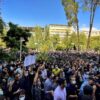
Image right: Iranian Christian in fervent prayer. Iran's clerical regime considers Muslims who convert to the Christian faith to be threats to national security.
Ayatollahs are rulers, not servants
Western media often refer to ayatollahs as Muslim scholars or theologians. So it's easy to believe that they are the Shia equivalent of bishops. But in reality, they have a very different function and role. Christian leaders are pastors, which means shepherds, and see themselves as servants.
But ayatollahs are not servants. They are rulers - experts in Islamic law who have divine authority to dictate to the people how they should live. Ayatollah means sign of God. So to disobey an ayatollah is to disobey God.
 Iran's Ayatollahs: powerful and extremist
Iran's Ayatollahs: powerful and extremist
Before the 1979 revolution, the immense power of the Ayatollahs was partly limited by being subordinate to the Shah (King) and his government. But since 1979, when Ayatollah Khomeini deposed the Shah and established the Islamic Republic, there have been no limits to their authority.
To make matters worse, extremism is inevitable in the system through which ayatollahs are trained. Take this statement for example:
"If a person says to you that he has a new interpretation of Islam, punch him in the face." Ayatollah Mesbah-Yazdi, deputy head of the Assembly of Experts.

School children were used to clear mines
It was the ayatollahs who were behind the use of schoolchildren to clear mines in the Iran-Iraq war in the 1980s. It was their policy to execute thousands of young people in 1988 for having links to a left-wing Islamic cult.
"If you stand against us, we will crush you"

"House churches are enemies of Iran"
In 2010, he declared that "house churches are the enemies of Iran". These policies and many others, including the rulings on women's rights, are all extreme.
"Extremism is not the fanatical thoughts of individual politicians gone astray. No, it is the almost inevitable result of the ayatollahs' education, their expertise in mysticism and their place in a system that is completely closed."

No external grading on the program
Here he will study the foundations of Islam: the Quran (and therefore also Arabic), the traditions of Muhammad, Ali (the first Shia Imam) and the traditional law, Sharia. Students do not sit final exams with independent examiners. Instead, the teacher judges whether the student can become a mullah and be the leader of a local mosque.
Exceptional students get the title Hojjat-ol Eslamwhich means 'proof of Islam'. A Hojjat-ol Eslam is above a mullah, but he cannot present an independent interpretation of Islamic law to Muslims, nor can he issue a fatwa or edict. To do so, he must first study for at least two or three more years and acquire the ability to argue for a particular interpretation.
Again, it is the student's mentor and not an independent exam that determines whether the student has proven that he is a skilled lawyer. If this is the case, then he will be awarded the title Mujtahidi.e. someone who is qualified to independently assess the interpretation (and application) of Islamic law. Once you become a Mujtahid, you can eventually call yourself an Ayatollah.
Claustrophobic atmosphere

"The Ayatollahs' studies have been almost exclusively focused on Islamic law and they have never known other ways of seeing the world."
They do need to master the art of logical argumentation, but individual and critical thinking is not encouraged. This claustrophobic mental atmosphere has contributed to the ayatollahs' tendency towards extremism.
Experts in mysticism
A common part of mullah training is the teaching of mysticism. This dates back to the 17th century teachings of Mullah Sadra. One of the practices that students are trained in is heirloomwhich means knowledge. This is a method whereby the mullah is taken on a journey under the supervision of a mentor who leads him to see outsiders, including humans, as 'signs from God', and ultimately an experience of the divine as light.
Students are taught to meditate, sometimes for up to 40 days, on a single sentence from the Quran. The goal is to understand the hidden meaning of the phrase. The words are repeated in the mind every waking moment, except when the student is in class or reading, even while sleeping.
There are also 'prayer nights' where passages from the Quran or prayers in Arabic are repeated for hours to achieve a revelation or spiritual understanding. One of the rules is that you are not allowed to sleep after midnight on Thursdays until the prayers to be recited at dawn are completed.
This certainly encourages extremism among the ayatollahs. It 'nurtured the feeling that they were a spiritual elite' and that they were in close contact with God. This gives the ayatollahs, who can independently judge in all areas of Islamic law and jurisprudence, a worrying degree of self-confidence that tends towards extremism.
Thousands dead due to Ayatollah order

"Ayatollah Khomeini ordered his troops to invade Iraq to liberate Jerusalem via Baghdad. Thousands of young Iranians were killed and Ayatollah Khomeini was visited by an old student, Ayatollah Mehdi Haeri Yazdi. After they exchanged pleasantries, Ayatollah Yazdi spoke of those who had died in the war and pleaded for a ceasefire. Ayatollah Khomeini turned to him and asked: "When there is an earthquake, do you question God?". Ayatollah Yazdi did not answer and walked away. Because that answer left no room for reason."
Ayatollah Khomeini, an expert in the mysticism of Mullah Sadra, could not be questioned because he was a 'sign from Allah'. Just as Allah could send earthquakes, Ayatollah Khomeini could send war.
A closed club

Often this bond is further strengthened through marriage, as it is very common for the family members of senior mullahs and ayatollahs to marry each other. And beyond these ties, there is also the very mundane issue of career: the success or failure of a student depends entirely on the teacher.
Unlike the Western education system, where you get ahead primarily by virtue of your abilities and where teachers are also held accountable, in this system there are no external examiners. All the power is internal. The Ayatollahs belong to a closed club. And since 1979, when they gained political power, there has been no authority that could oppose an ayatollah as long as he fundamentally supports the prevailing orthodoxy; hence the extremism.
Dissenters are silenced

So Ayatollah Montazeri, once the right-hand man of the Supreme Leader, spent the last years of his life under house arrest for condemning the regime's actions. His successor, Ayatollah Sanei, has been under investigation and has been demoted.
Dissenting ayatollahs are imprisoned
Other critical voices have fared even worse. Ayatollah Borujerdi is in prison for arguing for the separation of state and religion. Rumor has it that Ayatollah Khalaji is also behind bars for his critical views, and it is said that Ayatollah Jooybari has been tortured for his opposition to the government. The fact that serious criticism of majority views is not tolerated is yet another reason why the entire Ayatollah system is leaning towards extremism.
Iranians: going from extremism to Jesus
"The extremism and power of the Ayatollahs has had an unexpected result. Millions have become deeply disillusioned - not only with the Ayatollahs, but also with the religion they represent."
Jesus said: "You can recognize a tree by its fruit". The fruit of the last 30 years in Iran is evident to everyone. And as the bold church shares the love of Christ, Iranians are drawn to the purity, grace and love of Jesus. They are ready to turn to Jesus. That's why it's so important that we in Denmark ensure that Bibles are smuggled into Iran. As thousands of Iranians meet Jesus, they need the Bible so that their faith can have a healthy foundation and they can grow in their faith. Thank you to everyone who is helping to ensure that the Bible is smuggled into Iran.
When Iranians come to faith in Jesus, they also pray for the mullahs and ayatollahs, as the Bible teaches us, and already some in this elite religious circle have also turned to Jesus.
It only costs 80 DKK to finance the customization of a beautifully bound Bible for Iran, including all administration costs.
Support
Danish European Mission's partner, Elam Ministries, has contributed to the article.






